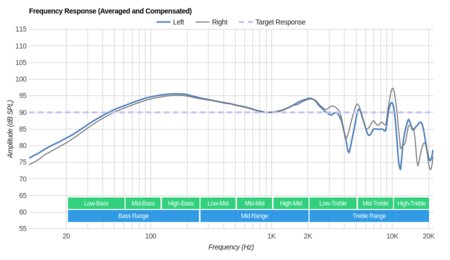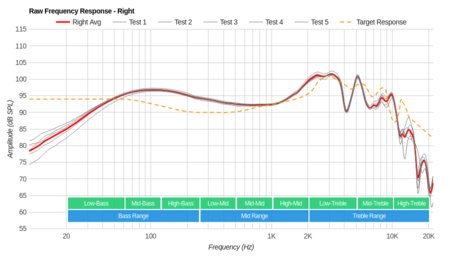The Koss Porta Pro KTC are decent-sounding and portable on-ear headphones for critical listening and mixed usage. They're lightweight, comfortable, and have a compact, retro design that will work for some. They also have a decently balanced and open sound for an on-ear device although they won't be the best sounding headphones for more serious critical listeners. Unfortunately, they also feel flimsy and cheap and don't block any noise so they'll struggle a little in noisy conditions.
Our Verdict
The Koss Porta Pro aren't the most versatile headphones. They don't isolate much and leak due to their open design. They're also flimsy and lacking in features; however, they produce a well-balanced sound on par with much more expensive headphones. This makes them a good, budget recommendation for critical listening but they might not be well-suited for other uses.
- Lightweight and comfortable design
- Above-average audio reproduction.
- No isolation from ambient noise, by design.
- Weak and flimsy build quality.
- Leaky at higher volumes, by design.
The Koss Porta Pro have decent sound with a deep and rich bass, good instruments and vocals, and tapered highs that do not sound too sharp. The open design gives them a decent soundstage, and although they won't sound as clear or detailed as some expensive neutral listening headphones, their sound quality is more than sufficient for most listeners.
The Koss Porta Pro aren't ideal for commuting. These headphones barely isolate listeners from ambient noise and won't perform well in loud environments.
The Koss Porta Pro are average at best for sports. They're lightweight, compact and have a moderately decent control scheme. The open design also allows you to monitor your environment. However, they won't be stable enough for intense exercise, and they have a lot of moving parts that can get caught on your hair or clothing.
The Koss Porta Pro are subpar for office use. They leak at higher volumes and don't prevent the chatter of a lively office from seeping into your audio.
The Koss Porta Pro are average for gaming. They have a wired connection, so they have negligible latency which is suitable for gaming. They also have a decent microphone that's compatible with some consoles. Unfortunately, they lack a good app to customize their sound profile like most gaming headsets, and they're a bit too tight on the head to wear for really long gaming sessions.
Changelog
- Updated Nov 21, 2019: Converted to Test Bench 1.3.1.
- Updated Nov 21, 2019: Converted to Test Bench 1.3.
- Updated Feb 16, 2018: Converted to Test Bench 1.2.
- Updated Oct 02, 2017: The microphone has been tested with our new methodology, as explained here
Check Price
Popular Headphones Comparisons

The Koss Porta Pro are a good option if you're looking for budget critical listening headphones. They're one of the best on-ear headphones we've tested in this price range. They're comfortable, lightweight, and have a decent open sound that caters well to most tracks. They sound sufficiently good for casual and more critical listeners but have a fragile build quality and don't block any noise due to their open design, so they won't be the most suitable for commuting especially when compared to some other on-ears. See our recommendations for the best headphones under $50 and the best closed-back headphones.
The Koss Porta Pro are a slightly better headphone overall when compared to the Koss KSC75. The Porta Pro have a better-balanced sound and a more comfortable on-ear fit that you can wear for longer than the KSC75. The Porta Pro also have a better more durable design, although not by much. On the upside, the KSC75 are bit more portable and have a slightly more stable design if you plan to use them for sports.
The Koss Porta Pro Wireless are a wireless variant of the regular Koss Porta Pro with a similar performance overall. The wireless variant of the Porta Pro are a bit more practical for everyday use. They also have a bit more range so you can leave your device on a table and still listen to your audio. The wired Porta Pro, on the other hand, have zero latency when watching videos. They also do not have a battery since they are completely passive, so you will never be without music.
The Koss Porta Pro KTC are slightly better headphones than the Grado SR80e/SR80. The Grado have a better build quality and a more open sound for critical listening with a larger soundstage than the Koss. The Koss, on the other hand, have a more outdoor-friendly design despite being open thanks to their portable on-ear format and in-line remote if you get the KTC variant. They also deliver more bass than the Grado, which some listeners will prefer, and they are compact enough to carry around on your person without much hassle, unlike the Grado.
The Audio Technica ATH-M60x are a much better critical listening on-ear than the Koss Porta Pro KTC. The Audio Technica have a better build quality, a better-balanced sound, and look much more premium and durable than the Koss. They also have replaceable cables and a closed-back design that isolate a little better in noise conditions. On the other hand, because the Koss are open, they deliver a larger soundstage than the Audio Technica. They're also more portable and come with an in-line remote variant that you can use with your phone, unlike the Audio Technica.
Test Results

The Koss Porta Pro have a unique and retro appeal that isn't for everyone. They have small plastic on-ear ear cups that are attached to a thin metal frame. That, combined with the fragile-looking audio cables and overall flimsy build quality, makes them feel like cheap airline headphones.

The Koss Porta Pro are extremely lightweight for on-ears. The headband is flexible and easily adjustable, which makes them above-average comfortable. They're not too tight; however, they do have an adjustable tension slider on the ear cups. It doesn't change much to the fit but it's a nice addition to the design. Unfortunately, they're poorly padded so they don't provide any extra comfort apart from their lightweight fit.

The Koss Porta Pro come with an in-line control module that provides call/music, track skipping, and volume controls. This is a definite upgrade from the regular version of these headphones, as it gives some control over your audio. However, the buttons on the module feel cheap and shallow. They don't provide good tactile feedback and are a bit frustrating to use.

The Koss Porta Pro are one of the most breathable on-ears we've tested. They have an open-back design and since they just rest on your ears and don't seal like over-ears do, they barely cause any temperature difference even while running or working out. They may not be stable enough for sports but they are definitely breathable enough for even intense workout regimens.

The Koss Porta Pro fold into a small, compact format that's easy to carry around and even fits in some pockets. They're on the smaller side for an on-ear model, which combined with the unique folding mechanism makes these headphones quite portable. They'll easily fit into most bags and shouldn't be too much of a hassle to carry on your person.
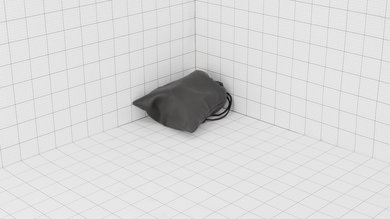
These headphones come with a simple faux leather pouch that will protect them from scratches and minor water exposure. However, it won't shield them against falls or any physical damage.

The build quality is subpar and feels cheap. The headband is a thin metal frame with no padding and an awkward sliding mechanism to adjust its size. The ear cups aren't particularly dense, although their lightweight build makes hard falls less damaging. Unfortunately, they don't feel durable. They have a lot of moving parts that will wear over time. The audio cables are thin, frail, and could snap relatively easily from regular use.

They have a moderately stable fit. The lightweight and relatively flat ear cup design make them not sway much when used while running. However, they're not the most stable. The slight lack of tightness means they might fall off during high-intensity exercises and the audio cables are a little bothersome and non-detachable. They'll yank the headphones off your head if hooked on something.

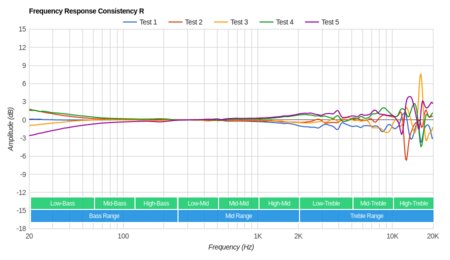
The frequency response consistency is very good. In the bass range, we measured about 4dB of deviation in delivery across our human subjects. This is subtle and not very noticeable since the deviation happens mostly in the sub-bass region. The treble delivery also deviates by about 4dB across multiple re-seats, which is noticeable but within good limits.

The Koss Porta Pro have a decent bass. LFE (low-frequency extension) is at 32Hz, which is decent. Low-bass, responsible for the thump and rumble common to bass-heavy music and sound effects is lacking by 3dB. This will be rather subtle since sub-bass frequencies are difficult to hear and are mostly felt. Mid-bass, responsible for the body of bass guitars and punch of the kick drums, is hyped by about 4dB. Also, high-bass, responsible for warmth is overemphasized by more than 5dB, making the overall bass boomy and muddy.
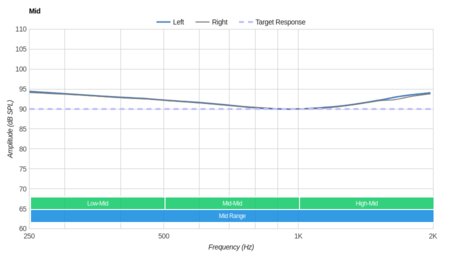
The Koss Porta Pro's mid-range performance is very good. The response throughout the range is very even but consistently overemphasized. Low-mid is over our neutral target by more than 3dB. This thickens the vocals and lead instruments a bit and makes the overall sound rather muddy. High-mid is overemphasized by about 2dB, bringing a bit of excess projection and intensity to vocals and instruments.
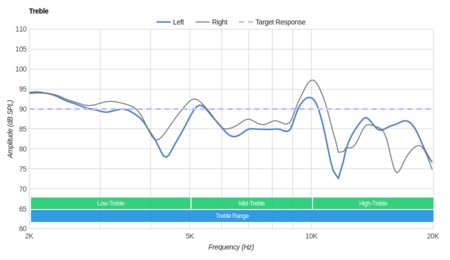
The treble performance is about average. The response throughout the range is rather uneven, so some regions are overemphasized and some other regions are underemphasized. However, the overall profile of the treble is a bit on the warm side. The dips around 4kHz and 7kHz negatively affect the detail and brightness of the sound, especially on vocals and lead instruments.

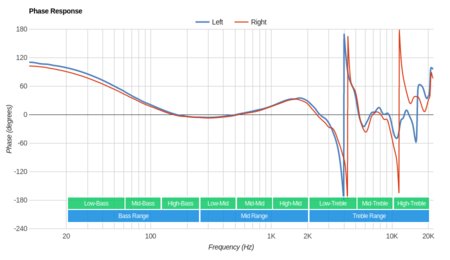
The Koss Porta Pro have excellent imaging performance. Weighted group delay is at 0.26, which is very low. Also, the GD graph shows that the entire group delay response is below the audibility threshold. This results in a tight bass and a transparent treble reproduction. Additionally, the L/R drivers of our test unit were exceptionally well-matched in frequency, amplitude, and phase response, which results in an accurate placement and localization of objects (voices, instruments, video game effects) in the stereo field.

The soundstage is sub-par. Due to their on-ear design, they don't interact with or activate the resonances of the pinna. Therefore their soundstage will be perceived as small and located inside the listener's head. However, due to their open-back design, they'll sound a bit more open compared to closed-back headphones.
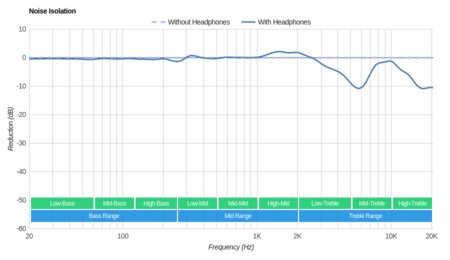
The Koss Porta Pro have poor isolation. Since they have an open-back, this is expected and part of their design. Therefore, they don't provide any isolation in the bass and mid ranges and provide only about 6dB of isolation in the treble range, which is barely noticeable.

The Koss Porta Pro's isolation performance is sub-par. This is expected and part of their design, since they're open-back. A significant portion of their leakage is spread between 1kHz and 16kHz, which is a broad range. This indicates a leakage that is quite bright sounding. The overall level of their leakage is also rather loud. With the music at 100dB SPL, the leakage at 1 foot away averages at 48dB SPL and peaks at 68dB SPL, which is noticeably louder than the noise floor of an average office.
The Koss Porta Pro have a mediocre microphone. In quiet environments, speech recorded or transmitted with this mic sound noticeably thin and rather lacking in detail. However, it will have a decent amount of air and openness to it and will be decently understandable. In noisy situations, they do an average job separating speech from background noise but will struggle to do so in louder environments like a very busy street.

The in-line microphone has a sub-par recording quality. The LFE (low-frequency extension) of 494Hz indicates a recorded/transmitted speech that sounds noticeably thin. The HFE (high-frequency extension) of 10kHz results in a speech that has a decent amount of air and openness to it. However, the 20dB dip around 6kHz negatively affects the detail and brightness of speech. It'll still be decently understandable, though, since speech comprehensibility is mostly dependent on the 500Hz-4kHz range.

The microphone's noise handling is average-at-best. It achieved a speech-to-noise ratio of 15dB SPL in our SpNR test, indicating they're best suited for quiet and moderate environments. In loud places, they'll struggle to fully separate speech from ambient noise.
These headphones don't have a battery, unlike the Koss Porta Pro Wireless.
The Koss Porta Pro don't come with any dedicated app of software support.
These headphones are wired and do not have a Bluetooth connection. If you want a similar but wireless design, consider the Koss Porta Pro Wireless.

These headphones have a 1/8" TRRS audio cable with an inline remote microphone that's compatible with the PS4 but not the Xbox One. This is most likely due to The iOS-specific audio cable.
The Koss Porta Pro don't have a dock. If you need a headset with a dock that also has a wired connection for gaming or watching movies, then consider the SteelSeries Arctis 7 2019 Edition Wireless.







